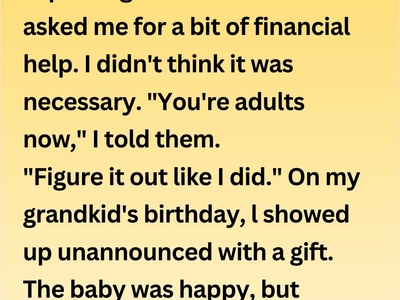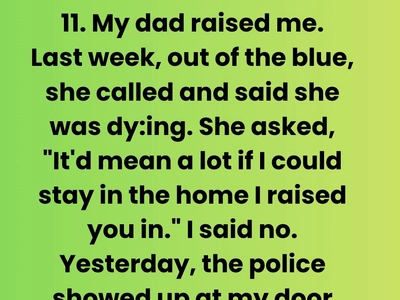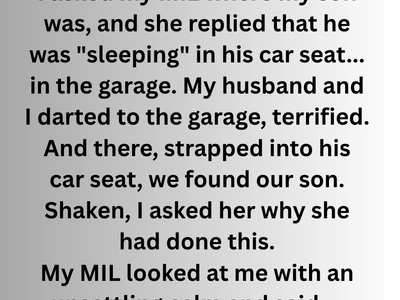I Refused to Help My DIL With Money—Now She’s Setting Ridiculous Boundaries
When money enters the picture, family relationships become more complicated. Love and trust get tangled with expectations, disappointment, and pride. I learned that the hard way, and the fallout has been heavier than I ever imagined.
It began when my son and his wife were expecting their first baby. They came to me, hopeful and nervous, and asked for some financial help. They didn’t ask for much detail at first, only said things were tight, and they wanted to be prepared for the arrival of their child. I remember the way my daughter-in-law looked at me, her hand resting on her belly, her eyes filled with a mixture of worry and hope. My son, quiet but clearly uncomfortable, avoided my eyes and pretended to study the carpet.
I had worked hard all my life to build what I had. I had raised my son without leaning on anyone else. I believed that becoming an adult meant figuring things out for yourself, finding a way to stand even when the ground shook. So when they asked, I shook my head gently. “You’re adults now,” I told them. “It’s time for you to figure it out like I did.” I thought I was giving them the gift of independence, teaching them resilience. I thought my words would push them forward.
But my daughter-in-law’s face hardened. She didn’t say anything to me directly, just pressed her lips together, nodded stiffly, and put her arm around my son as if to shield him from my refusal. From that moment, something between us shifted. It was subtle at first, a coolness in her tone, a careful distance when she spoke to me. I thought it would pass. I thought she would understand. But then she made it clear: if I wasn’t willing to help them, I wouldn’t be welcome to see the baby.
The announcement hit me like a punch in the chest. My first grandchild, the child I had already dreamed of holding, would be kept from me. I couldn’t believe she had the audacity to draw such a harsh line. My son didn’t fight me, didn’t fight her either—he just stayed quiet, as though he had chosen silence as his safest refuge.
The anger and sadness boiled inside me until I couldn’t keep it in. Out of frustration, I reached out to a mutual family friend, hoping to release some of the pressure that had built up inside me. I didn’t think it would hurt anything. I thought venting would give me relief, and perhaps even a little understanding. I told the friend how unfair the situation felt, how ungrateful my daughter-in-law seemed, how much it hurt to be shut out.
The very next day, my phone rang. Her voice was sharp, trembling, and full of tears. “I heard you were gossiping about me,” she said. My stomach dropped. She had found out. Worse, the words I had spoken in a moment of weakness had been twisted, stretched into something crueler than I had meant. “How could you?” she cried before I could explain. I tried to calm her, to tell her I hadn’t meant for things to come across the way they had, but she didn’t want to listen. Her voice cracked, and then the line went dead.
The silence that followed was heavier than any fight we had had before. Days passed, then weeks, and I heard nothing. I wasn’t invited to see the baby when he was born. My son sent a short text to announce the birth, but no pictures followed. I scrolled through social media, desperate to catch glimpses of the child who shared my blood, but my daughter-in-law had made sure I couldn’t see. Each day felt like a punishment, and each night I replayed our conversations in my head, wondering where I could have chosen differently.
Months later, when my grandson’s first birthday came around, my longing overpowered my pride. I couldn’t stand the thought of another milestone slipping away. So I drove to their house uninvited, clutching a wrapped gift in my arms, my heart hammering with both hope and fear. When the door opened, my daughter-in-law stood there, her eyes swollen and red from crying. The baby was in her arms, chubby and beautiful, with a small smile on his face as he reached for the light outside. My breath caught in my throat at the sight of him, my grandson, so real and close.
But the moment dissolved as quickly as it came. She looked at me, her face darkening, and without a word she snatched the gift from my hands. Then she shut the door in my face. I stood there, frozen, staring at the closed door, feeling the weight of rejection press down on me. I wanted to scream, to pound on the door, to beg her to let me in. Instead, I walked back to my car, clutching my empty hands, my heart breaking with every step.
I thought bringing a gift might soften her anger, that maybe it would show I was willing to reach out, willing to repair what had been broken. But it wasn’t enough. Maybe it was the wrong approach. Maybe it was too soon. Maybe she didn’t want gifts at all—she wanted an apology, an acknowledgment that I had failed to understand their situation.
I realized later that I had crossed a boundary by showing up unannounced. She had asked for space, and instead of honoring it, I barged into her world uninvited. I thought I was fighting for love, but in her eyes, I was ignoring her voice. I thought I was offering peace, but to her, I was pressing my presence where it wasn’t welcome.
In the quiet days that followed, I reflected on what had gone wrong. I began to see that trying to force reconciliation only pushed her further away. Every time I thought about calling, every time I considered driving over again, I stopped myself. Pressuring her with visits and guilt—pleading that I just wanted to see my grandchild—would only prove that I wasn’t listening to her needs.
And then I thought back to that conversation with the family friend. That had been another mistake, maybe one of the biggest. Sharing private pain with outsiders had only added fuel to the fire. My words had been reshaped, my intentions misunderstood, and the result was a wound deeper than the first. I should have kept the conversation inside the family, or better yet, waited until I was calm enough to speak directly to my son and daughter-in-law. But I hadn’t, and now the damage seemed almost impossible to undo.
I also began to see the gap in perspective between us. When I was younger, when I had my child, times were different. Money was still tight, but I believed you just had to make do. You worked harder, sacrificed more, and pushed through. But the world now is not the same as it was back then. Rent, childcare, healthcare—all of it costs so much more. Saying “I figured it out, so you should too” wasn’t encouragement. It was dismissal. It was telling them their struggle wasn’t real, even though it was.
I wish I had realized that sooner. Even if I couldn’t give them money, there were other ways I could have supported them. I could have cooked meals so they didn’t have to. I could have offered to babysit once the baby arrived, giving them a chance to rest. I could have simply listened without judgment, showing them I understood. But instead, I let my pride speak louder than my compassion, and the price I paid was distance from the very people I wanted to love.
Now, all I can do is wait and try to rebuild, step by cautious step. I know that if I ever want to hold my grandson again, I must start with humility. I must take full responsibility for the pain I caused. I must show, not just tell, that I can respect their boundaries. Maybe one day I can write a letter, carefully choosing words that admit my mistakes without blaming them for their reaction. Maybe one day I can apologize in person, not with excuses but with sincerity.
It isn’t easy to accept that my actions, meant to protect or guide, only ended up creating walls. But perhaps those walls can come down, brick by brick, if I show patience and consistency. Perhaps, in time, they will see that I am not their enemy, but someone who wants to love them and their child fully.
Until then, I carry both regret and hope in my heart. Regret for the words I said, the choices I made, the boundaries I ignored. Hope that love—stubborn, enduring love—will find its way back into our family. Hope that my grandson will grow up knowing that even if I stumbled, I never stopped caring.






